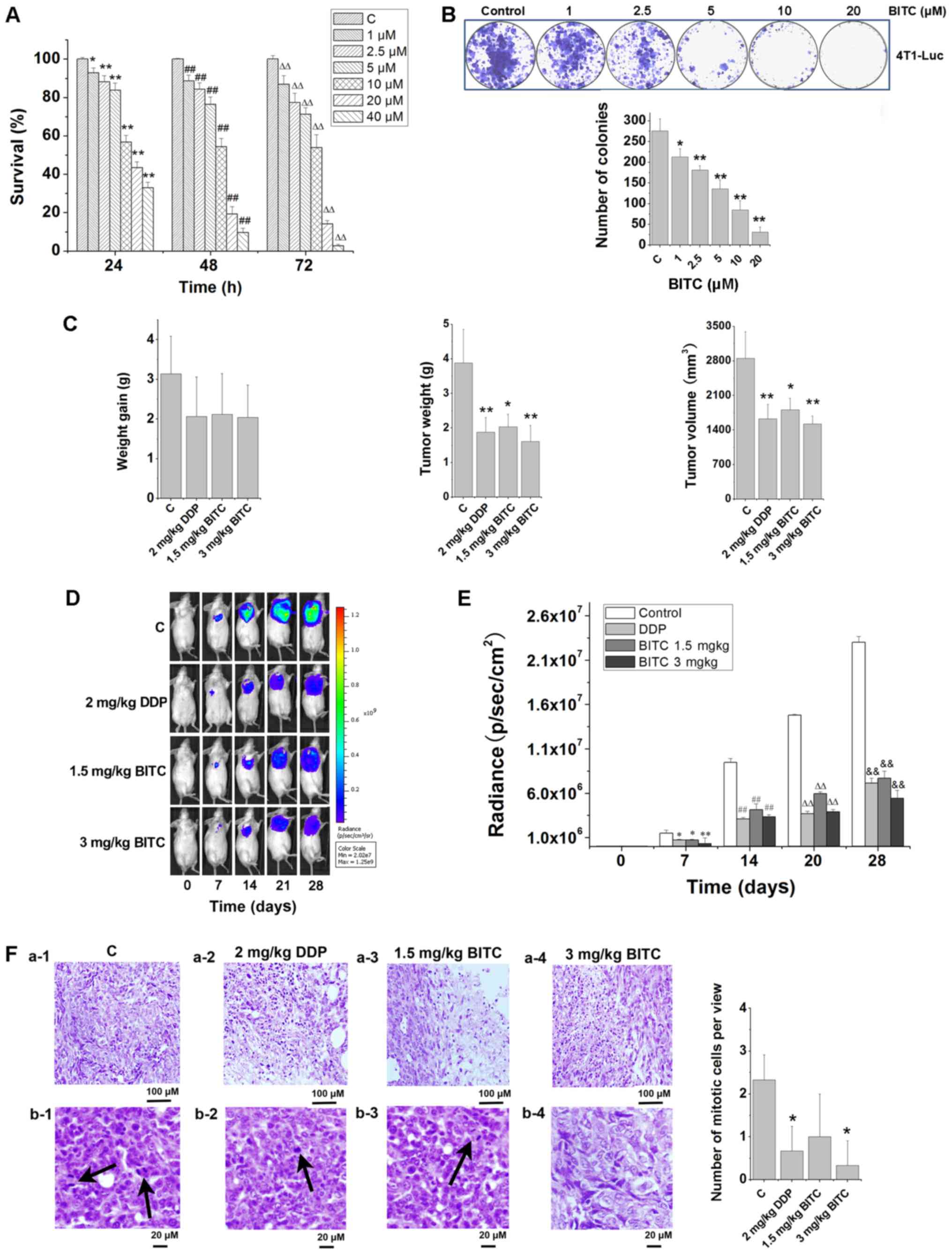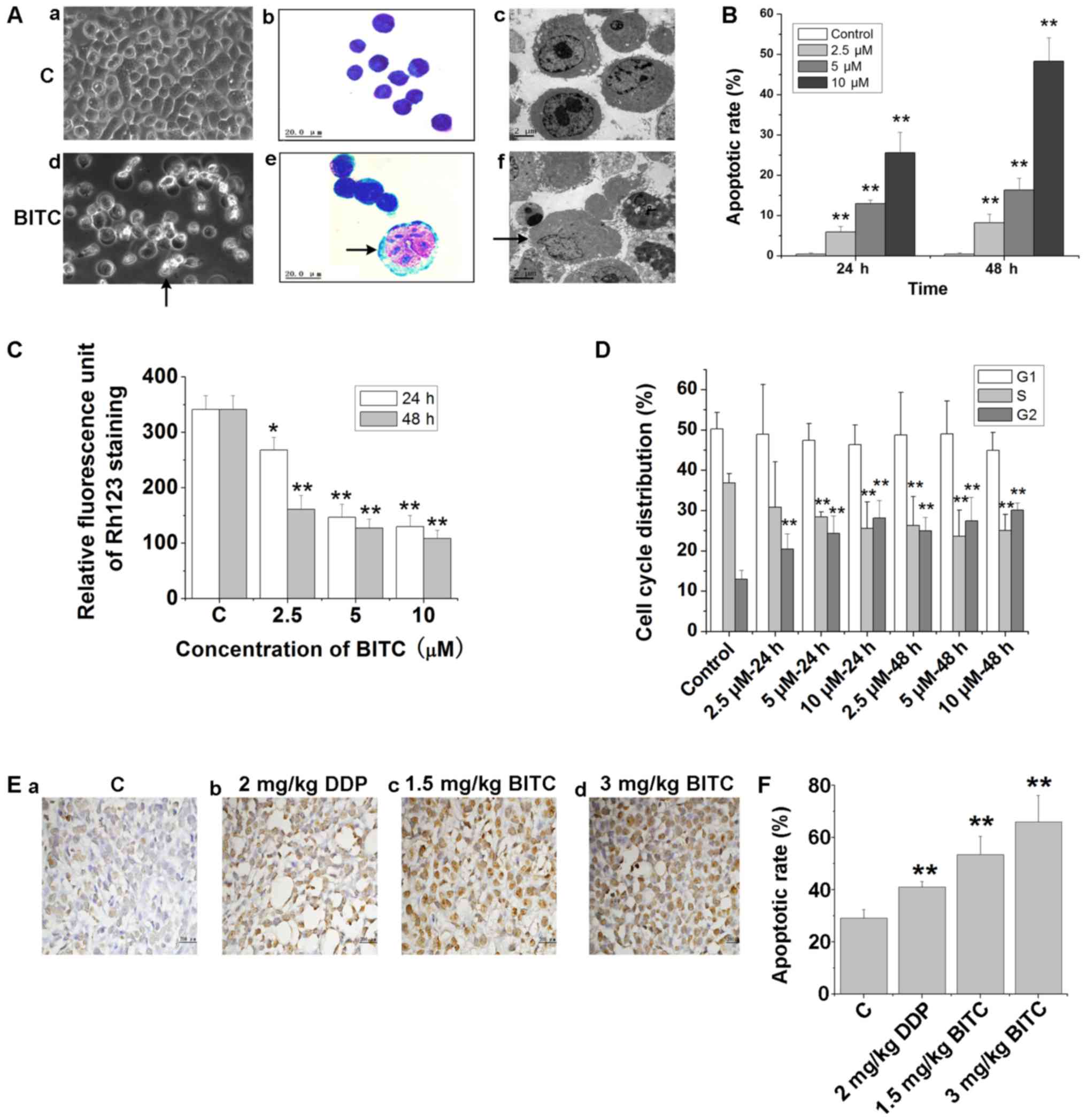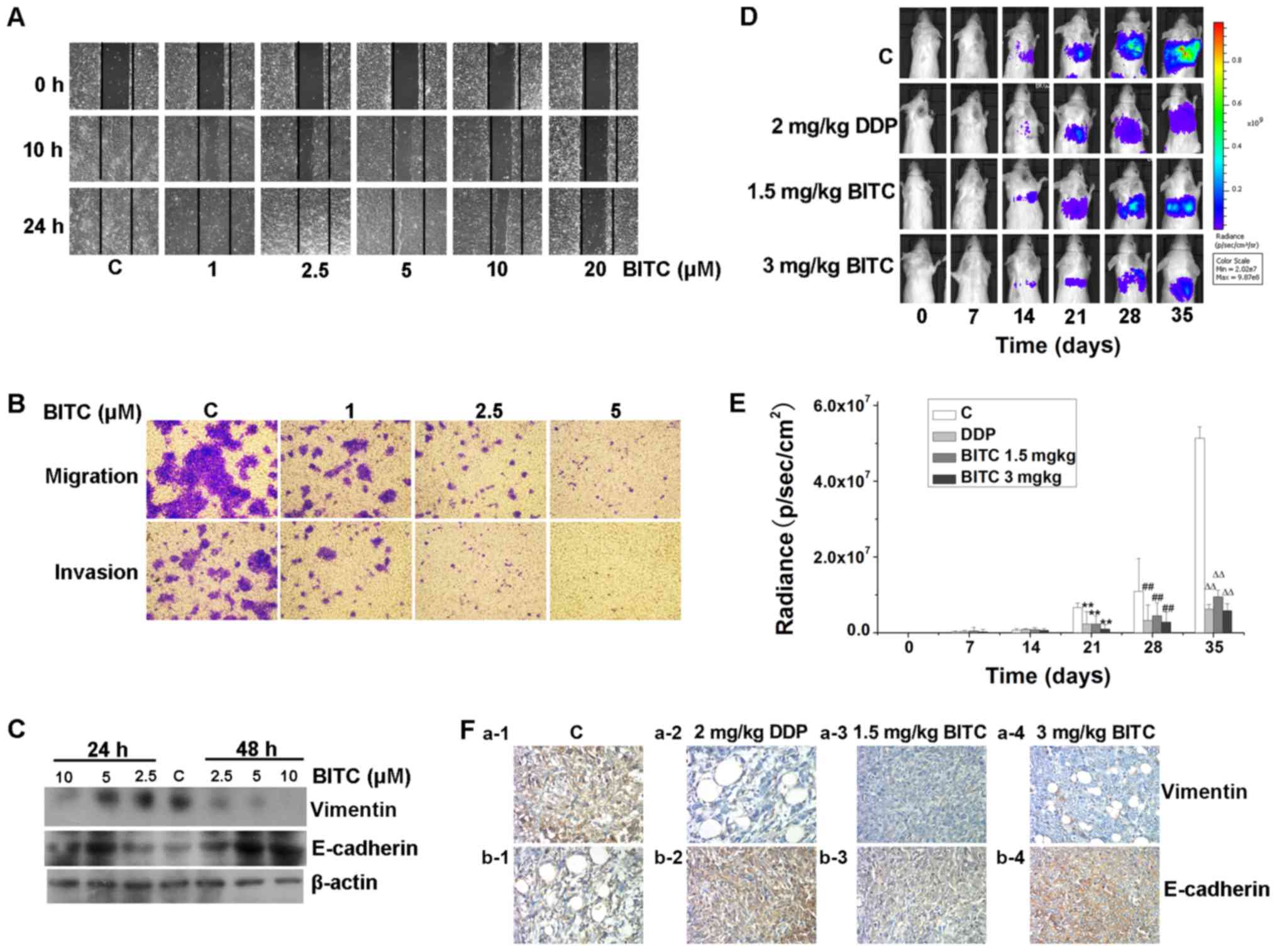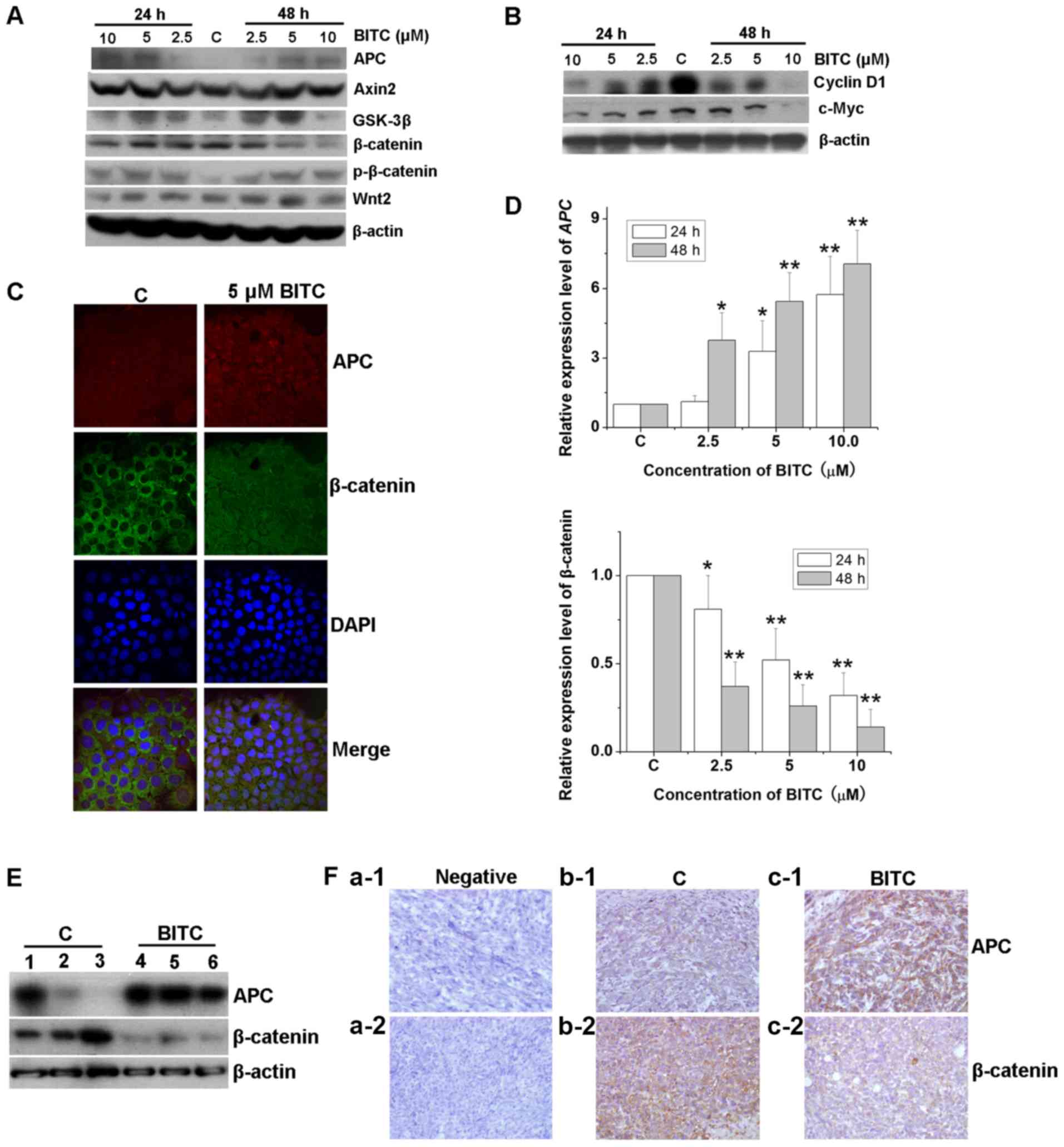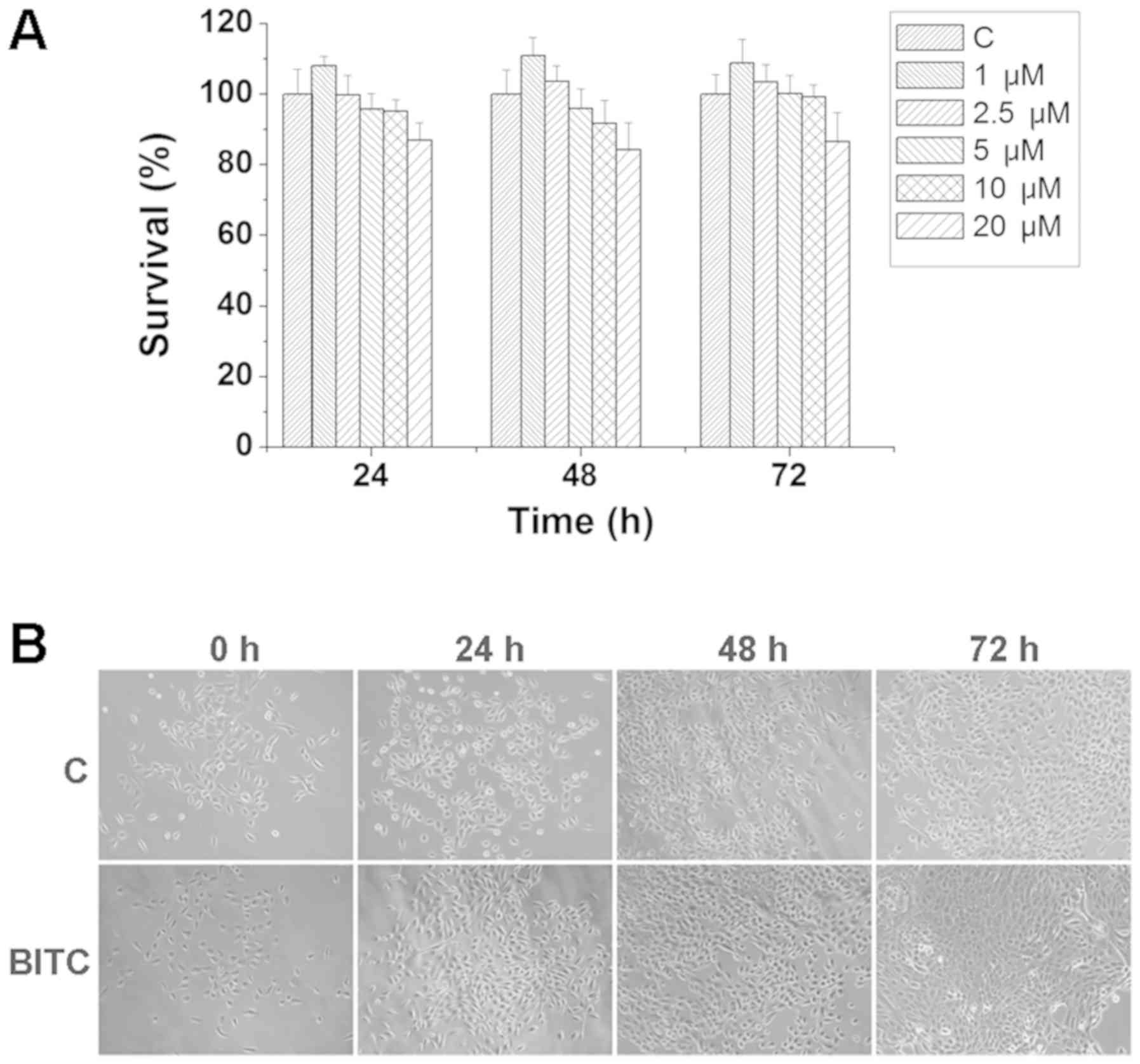|
1
|
Avtanski DB, Nagalingam A, Bonner MY,
Arbiser JL, Saxena NK and Sharma D: Honokiol inhibits
epithelial-mesenchymal transition in breast cancer cells by
targeting signal transducer and activator of transcription
3/Zeb1/E-cadherin axis. Mol Oncol. 8:565–580. 2014. View Article : Google Scholar : PubMed/NCBI
|
|
2
|
Nagalingam A, Arbiser JL, Bonner MY,
Saxena NK and Sharma D: Honokiol activates AMP-activated protein
kinase in breast cancer cells via an LKB1-dependent pathway and
inhibits breast carcinogenesis. Breast Cancer Res. 14:R352012.
View Article : Google Scholar : PubMed/NCBI
|
|
3
|
Chen H and Liu RH: Potential mechanisms of
action of dietary phytochemicals for cancer prevention by targeting
cellular signaling transduction pathways. J Aqric Food Chem.
66:3260–3276. 2018. View Article : Google Scholar
|
|
4
|
Gründemann C and Huber R: Chemoprevention
with isothiocyanates-from bench to bedside. Cancer Lett. 414:26–33.
2018. View Article : Google Scholar : PubMed/NCBI
|
|
5
|
Soundararajan P and Kim JS:
Anti-carcinogenic glucosinolates in cruciferous vegetables and
their antagonistic effects on prevention of cancers. Molecules.
23(pii): E29832018. View Article : Google Scholar : PubMed/NCBI
|
|
6
|
Jutooru I, Guthrie AS, Chadalapaka G,
Pathi S, Kim K, Burghardt R, Jin UH and Safe S: Mechanism of action
of phenethylisothiocyanate and other reactive oxygen
species-inducing anticancer agents. Mol Cell Biol. 34:2382–2395.
2014. View Article : Google Scholar : PubMed/NCBI
|
|
7
|
Warin R, Chambers WH, Potter DM and Singh
SV: Prevention of mammary carcinogenesis in MMTV-neu mice by
cruciferous vegetable constituent benzyl isothiocyanate. Cancer
Res. 69:9473–9480. 2009. View Article : Google Scholar : PubMed/NCBI
|
|
8
|
Ni WY, Hsiao YP, Hsu SC, Hsueh SC, Chang
CH, Ji BC, Yang JS, Lu HF and Chuang JG: Oral administration of
benzyl-isothiocyanate inhibits in vivo growth of subcutaneous
xenograft tumors of human malignant melanoma A375.S2 cells. In
Vivo. 27:623–626. 2013.PubMed/NCBI
|
|
9
|
Kim KJ, Hong JE, Eom SJ, Lee JY and Park
JH: Oral administration of benzyl-isothiocyanate inhibits solid
tumor growth and lung metastasis of 4T1 murine mammary carcinoma
cells in BALB/c mice. Breast Cancer Res Treat. 130:61–71. 2011.
View Article : Google Scholar : PubMed/NCBI
|
|
10
|
Kim M, Cho HJ, Kwon GT, Kang YH, Kwon SH,
Her S, Park T, Kim Y, Kee Y and Park JH: Benzyl isothiocyanate
suppresses high-fat diet-stimulated mammary tumor progression via
the alteration of tumor microenvironments in obesity-resistant
BALB/c mice. Mol Carcinog. 54:72–82. 2015. View Article : Google Scholar : PubMed/NCBI
|
|
11
|
Liu X, Takano C, Shimizu T, Yokobe S,
Abe-Kanoh N, Zhu B, Nakamura T, Munemasa S, Murata Y and Nakamura
Y: Inhibition of phosphatidylinositide 3-kinase ameliorates
antiproliferation by benzyl isothiocyanate in human colon cancer
cells. Biochem Biophys Res Commun. 491:209–216. 2017. View Article : Google Scholar : PubMed/NCBI
|
|
12
|
Xie B, Nagalingam A, Kuppusamy P, Muniraj
N, Langford P, Győrffy B, Saxena NK and Sharma D: Benzyl
Isothiocyanate potentiates p53 signaling and antitumor effects
against breast cancer through activation of p53-LKB1 and p73-LKB1
axes. Sci Rep. 7:400702017. View Article : Google Scholar : PubMed/NCBI
|
|
13
|
Zhu M, Li W, Dong X, Chen Y, Lu Y, Lin B,
Guo J and Li M: Benzyl-isothiocyanate induces apoptosis and
inhibits migration and invasion of hepatocellular carcinoma cells
in vitro. J Cancer. 8:240–248. 2017. View Article : Google Scholar : PubMed/NCBI
|
|
14
|
Kasiappan R, Jutooru I, Karki K, Hedrick E
and Safe S: Benzyl isothiocyanate (BITC) induces reactive oxygen
species-dependent repression of STAT3 protein by down-regulation of
specificity proteins in pancreatic cancer. J Biol Chem.
291:27122–27133. 2016. View Article : Google Scholar : PubMed/NCBI
|
|
15
|
Lai KC, Hsiao YT, Yang JL, Ma YS, Huang
YP, Chiang TA and Chung JG: Benzyl isothiocyanate and phenethyl
isothiocyanate inhibit murine melanoma B16F10 cell migration and
invasion in vitro. Int J Oncol. 51:832–840. 2017. View Article : Google Scholar : PubMed/NCBI
|
|
16
|
Ma YS, Hsiao YT, Lin JJ, Liao CL, Lin CC
and Chung JG: Phenethyl iosthiocyanate (PEITC) and Benzyl
isothiocyanate (BITC) inhibit human melanoma A375.S2 cell migration
and invasion by affecting MAPK signaling pathway in vitro.
Anticancer Res. 37:6223–6234. 2017.PubMed/NCBI
|
|
17
|
Duchartre Y, Kim YM and Kahn M: The Wnt
signaling pathway in cancer. Crit Rev Oncol Hematol. 99:141–149.
2016. View Article : Google Scholar : PubMed/NCBI
|
|
18
|
Lee MA, Kim WK, Park HJ, Kang SS and Lee
SK: Anti-proliferative activity of hydnocarpin, a natural lignan,
is associated with the suppression of Wnt/β-catenin signaling
pathway in colon cancer cells. Bioorg Med Chem Lett. 23:5511–5514.
2013. View Article : Google Scholar : PubMed/NCBI
|
|
19
|
Schmitz Y, Rateitschak K and Wolkenhauer
O: Analysing the impact of nucleo-cytoplasmic shuttling of
β-catenin and its antagonists APC, Axin and GSK3 on Wnt/β-catenin
signaling. Cell Signal. 25:2210–2221. 2013. View Article : Google Scholar : PubMed/NCBI
|
|
20
|
Bilir B, Kucuk O and Moreno CS: Wnt
signaling blockage inhibits cell proliferation and migration, and
induces apoptosis in triple-negative breast cancer cells. J Transl
Med. 11:2802013. View Article : Google Scholar : PubMed/NCBI
|
|
21
|
Liu QQ, Chen K, Ye Q, Jiang XH and Sun YW:
Oridonin inhibits pancreatic cancer cell migration and
epithelial-mesenchymal transition by suppressing Wnt/β-catenin
signaling pathway. Cancer Cell Int. 16:572016. View Article : Google Scholar : PubMed/NCBI
|
|
22
|
Liu Y, Zhang L, Meng Y and Huang L: Benzyl
isothiocyanate inhibits breast cancer cell tumorigenesis via
repression of the FoxH1-Mediated Wnt/β-catenin pathway. Int J Clin
Med. 8:17601–17611. 2015.
|
|
23
|
National Research Council (US) Committee
for the Update of the Guide for the Care and Use of Laboratory
Animals, . Guide for the Care and Use of Laboratory Animals. 8th.
National Academies Press (US); 2011
|
|
24
|
Chen J, Cheng J, Yi J, Xie B, Lin L, Liu
Z, Zhao H, Wang B, Ai Z, Yang Y and Wei H: Differential expression
and response to arsenic stress of MRPs and ASAN1 determine
sensitivity of classical multidrug-resistant leukemia cells to
arsenic trioxide. Leuk Res. 50:116–122. 2016. View Article : Google Scholar : PubMed/NCBI
|
|
25
|
Livak KJ and Schmittgen TD: Analysis of
relative gene expression data using real-time quantitative PCR and
the 2(-Delta Delta C(T)) method. Methods. 25:402–408. 2001.
View Article : Google Scholar : PubMed/NCBI
|
|
26
|
Kocatürk B and Versteeg HH: Orthotopic
injection of breast cancer cells into the mammary fat pad of mice
to study tumor growth. J Vis Exp. Feb 8–2015.doi: 10.3791/51967.
View Article : Google Scholar
|
|
27
|
Rios Garcia M, Steinbauer B, Srivastava K,
Singhal M, Mattijssen F, Maida A, Christian S, Hess-Stumpp H,
Augustin HG, Müller-Decker K, et al: Acetyl-CoA Carboxylase
1-dependent protein acetylation controls breast cancer metastasis
and recurrence. Cell Metab. 26:842–855.e5. 2017. View Article : Google Scholar : PubMed/NCBI
|
|
28
|
Zhou J, Tao D, Xu Q, Gao Z and Tang D:
Expression of E-cadherin and vimentin in oral squamous cell
carcinoma. Int J Clin Exp Pathol. 8:3150–3154. 2015.PubMed/NCBI
|
|
29
|
Huang SH, Wu LW, Huang AC, Yu CC, Lien JC,
Huang YP, Yang JS, Yang JH, Hsiao YP, Wood WG, et al: Benzyl
isothiocyanate (BITC) induces G2/M phase arrest and apoptosis in
human melanoma A375.S2 cells through reactive oxygen species (ROS)
and both mitochondria-dependent and death receptor-mediated
multiple signaling pathways. J Agric Food Chem. 60:665–675. 2012.
View Article : Google Scholar : PubMed/NCBI
|
|
30
|
Hedrick E, Cheng Y, Jin UH, Kim K and Safe
S: Specificity protein (Sp) transcription factors Sp1, Sp3 and Sp4
are non-oncogene addiction genes in cancer cells. Oncotarget.
7:22245–22256. 2016. View Article : Google Scholar : PubMed/NCBI
|
|
31
|
Valencia A, Román-Gómez J, Cervera J, Such
E, Barragán E, Bolufer P, Moscardó F, Sanz GF and Sanz MA: Wnt
signaling pathway is epigenetically regulated by methylation of Wnt
antagonists in acute myeloid leukemia. Leukemia. 23:1658–1666.
2009. View Article : Google Scholar : PubMed/NCBI
|
|
32
|
Mahmood S, Bhatti A, Syed NA and John P:
The microRNA regulatory network: A far-reaching approach to the
regulate the Wnt signaling pathway in number of diseases. J Recept
Signal Transduct Res. 36:310–318. 2016. View Article : Google Scholar : PubMed/NCBI
|
|
33
|
Lu Y, Wei C and Xi Z: Curcumin suppresses
proliferation and invasion in non-small cell lung cancer by
modulation of MTA1-mediated Wnt/β-catenin pathway. In Vitro Cell
Dev Biol Anim. 50:840–850. 2014. View Article : Google Scholar : PubMed/NCBI
|
|
34
|
Li X, Zhang X, Liu X, Tan Z, Yang C, Ding
X, Hu X, Zhou J, Xiang S, Zhou C and Zhang J: Caudatin induces cell
apoptosis in gastric cancer cells through modulation of
Wnt/β-catenin signaling. Oncol Rep. 30:677–684. 2013. View Article : Google Scholar : PubMed/NCBI
|
|
35
|
Tan M, Gong H, Zeng Y, Tao L, Wang J,
Jiang J, Xu D, Bao E, Qiu J and Liu Z: Downregulation of
homeodomain-interacting protein kinase-2 contributes to bladder
cancer metastasis by regulating Wnt signaling. J Cell Biochem.
115:1762–1767. 2014. View Article : Google Scholar : PubMed/NCBI
|
|
36
|
Guo J, Fu Z, Wei J, Lu W, Feng J and Zhang
S: PRRX1 promotes epithelial-mesenchymal transition through the
Wnt/β-catenin pathway in gastric cancer. Med Oncol. 32:3932015.
View Article : Google Scholar : PubMed/NCBI
|
|
37
|
Pathi S, Jutooru I, Chadalapaka G, Nair V,
Lee SO and Safe S: Aspirin inhibits colon cancer cell and tumor
growth and downregulates specificity protein (Sp) transcription
factors. PLoS One. 7:e482082012. View Article : Google Scholar : PubMed/NCBI
|















